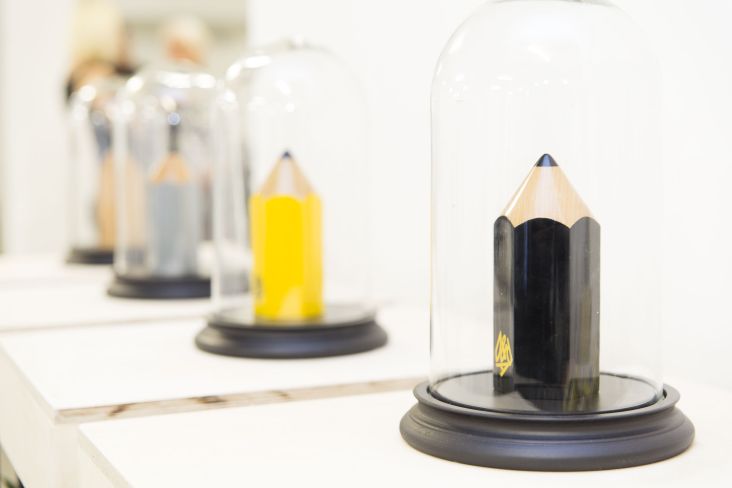10 proven hacks for laser-guided focus in a busy office
Do you find it hard to stay focused? Are you doing your best creative work? Offices are rife with distractions — particularly open-plan ones with non-creative teams nearby.

Image licensed via Adobe Stock
You probably find your attention span is slipping and you're not alone. Some studies say the average adult attention span is now less than a minute. That's scary stuff, but what an opportunity, when you've got ways to get lost in your work and get things done.
1. Focus is a muscle – so be your brain's personal trainer
Thinking focus as a muscle works on many levels. Muscles get tired when you exercise them. They to need to warm up for optimal performance. You must be careful with your form, so's not to get hamstrung. You should warm down, so you're not stiff and creaky for the next day. And you need good quality rest between sessions.
And, just like muscles, attention has much more to give than it lets on. You might be 'hitting the wall' in that open-plan office, but you can bust through it – with the right encouragement.
2. Split work into micro-tasks with visual cues and secret deadlines
Split up tasks into their constituent parts and make a visual representation of each. This could be in basic list form, or you might favour spider diagrams, mind maps, anything really. The point is that can you can see the task in manageable chunks, none of which should seem too daunting on their own.
If you're finding it hard to concentrate, the smaller the chunks, the better. If you're struggling even to get started, make a list of things you need to think about before you get going.
Every time you see a tick on your list, your brain will treat you to a little blast of dopamine, the reward neurotransmitter that is nature's way of getting stuff done (your levels of dopamine very much dictate your ability to concentrate. Every little helps).
You can also set personal deadlines for each bit on your list. Focus loves deadlines.
3. Talk yourself through it (but quietly, or you'll annoy people)
A lot of people say it's the first sign of madness, but for people wanting to get stuff done, talking to oneself is the very hallmark of sanity. Just keep it short, precise and positive.
Sports psychologist Antonis Hatzigeorgiadis says: "There is robust evidence that self-talk strategies facilitate learning and enhance performance."
He told Psychology Today: "It is a matter of personal preference or what works for each person; but generally, it is advised that self-talk is positively rather than negatively phrased and focuses on what you should do rather than on what you should avoid."
So tell yourself nicely what needs doing, and it shall be done! Beg your brain for an idea, and it will present one. If you find yourself about to click a link to See What Some Old Celebrity Looks Like Now, don’t tell yourself off – ask your brain why it even cares, and it'll get back down to serving up genius, pronto.
4. Multi-tasking is for mugs. Avoid like the plague.
A lot of your self-talk should be telling yourself to take on your micro-tasks one at a time. There's a backlash against multi-tasking right now, and that can only be a good thing.
You still see the ability to multi-task popping up in job descriptions,. Still, it's a fallacy that leads to sub-optimum performance because it's a whole lot of unnecessary dumbbells that your attention muscle needs to lift, moving back and forth between tasks, which gives you much less cognitive energy for pumping out the good stuff. One thing at a time does better work faster.
5. Right music, right volume = pure productivity
What music you listen to is up to you. It's very much a matter of personal preference. Some styles are more likely to hamper creativity than others. If you're the type of person that reckons they can't work with headphones on, maybe you've got the music at the wrong volume; how loud you should have your headphones depends on your personality.
According to Susan Cain's excellent book Quiet: The Power of Introverts in a World That Can't Stop Talking, introverts should play music quietly, extroverts should set their headphones louder. Noise levels that would be over-stimulating for more introverted characters are perfect for more gregarious types.
The main benefits of music over ambient background noise playlists is the negation of stress. Do doctors prescribe 10 hours of crackling campfires down by the riverside to patients awaiting major surgery? No.
Trust in the power of melody. You're probably not going to block out the noise of an office entirely – but having some familiar happy songs playing gently in your ear will help you be less annoyed by it.
Go for tunes that are upbeat and familiar, something that makes you feel young and carefree.
"You still see the ability to multi-task popping up in job descriptions, but it's a fallacy that leads to sub-optimum performance because it's a whole lot of unnecessary dumbbells that your attention muscle needs to lift."
6. Burst, break, burst, break…
We've all got a limit, concentration wise – even without the manifold distractions of an office. When I was at university, I found that I could 100% concentrate solidly for precisely 36 minutes. I know this because that every lecture, whenever I looked at my phone to see how long was left to run, it was always 36 minutes in without fail.
Consider what your time limit is, and go for scheduled screen breaks. A little walk for a couple of minutes. Stretch it out. Have a little chat. Replenish that water. The kinetic energy from walking encourages creative problem-solving in your subconscious.
7. Stay hydrated – but don’t cane the caffeine
Some studies say being as little as 2% dehydrated mimics the symptoms of depression – a big one is a failure to concentrate and focus. Too much caffeine mimics the symptoms of anxiety. Neither of these conditions is excellent for concentration.
Set limits for coffee, and targets for water. Whenever you feel like having a swig of water, down a few hundred millilitres instead, keep topped up, or the brain drain sets in quick.
I don't buy the conventional wisdom: "don't drink coffee after 1pm". For me, it's essential at about 2.30pm. Just don't hammer it, crash, hammer it again…pace yourself!
8. Warm-up and warm-down your amazing creative brain
Much loss of focus and procrastination comes from anxiety. The stress of working creatively in a busy office is easier to handle if you have a clear entrance strategy.
In the excellent The War of Art, screenwriter Steven Pressfield talks about his routine to get his head in gear: "I get up to take a shower, have breakfast. I read the paper, brush my teeth. If I have phone calls to make, I make them. I've got my coffee now…on my thesaurus is my lucky cannon. I point it towards my chair so that it can fire inspiration into me. I say my prayer, which is an invocation of the Muse from Homers from Homer's odyssey. I sit down and plunge in."
Now I doubt he's writing screenplays in an open-plan office, but the point still holds up. Run through your pre-match routine and your brain will get ready to play ball.
And if you're fortunate, the people who sit by you will notice your routine: the more seriously you seem to take it, the more likely they are to leave you to create in peace.
9. Make an exit journal - a one-way ticket to chill
You've focused all day at work. If you're going to be hot stuff tomorrow, your brain needs a breather. Now your job is to make the most of your downtime. It's poor form to have your mind repeatedly wander to work while you're trying to watch Netflix and keep asking your spouse/mate/cat what the hell is going on.
A lot of people make their 'to do' lists in the mornings. Making a comprehensive exit journal is better. Before you go home, map out tasks for tomorrow, what's bugging you and what you intend to do about it, conversations you need to have, etc.
Admitting you are anxious about something helps reduces your anxiety levels – anxiety is a legitimate response to various work situations. Writing down worries and proposed actions will help you leave them behind and come back fresh for the fight tomorrow.
Quickly prioritise it so you can get what's bugging you most out of the way first thing tomorrow…then leave. Grab yourself some life/work balance.
10. No, no, no, no, no notifications!
Should have been rule number one really, but it seems so obvious I didn't want to insult you.
Having incoming emails or anything else popping up on your screen, or your phone beeping with Twitter is just ridiculous. Do you need to know? If there's anything especially noteworthy, someone will probably ask you face-to-face.
A lot of CEOs live by only replying to the third attempt to email them – I think that's a great rule. I only wish I could get away with it myself – maybe one day!




 by Tüpokompanii](https://www.creativeboom.com/upload/articles/58/58684538770fb5b428dc1882f7a732f153500153_732.jpg)

 using <a href="https://www.ohnotype.co/fonts/obviously" target="_blank">Obviously</a> by Oh No Type Co., Art Director, Brand & Creative—Spotify](https://www.creativeboom.com/upload/articles/6e/6ed31eddc26fa563f213fc76d6993dab9231ffe4_732.jpg)









](https://www.creativeboom.com/upload/articles/0c/0c4eb84a3d8112c994a45f84e88a9629563248da_732.jpeg)

 by Bruce Davidson rendered in Play-Doh by Eleanor Macnair © Eleanor Macnair](https://www.creativeboom.com/upload/articles/cd/cdf0ccbeb01ccde9640819086ef12c9de6d46347_732.jpg)
](https://www.creativeboom.com/upload/articles/83/83fd4b3c88204af628d58ea896dc7585d7806b5f_732.jpeg)
](https://www.creativeboom.com/upload/articles/be/bed108bcce88d540085dc1b14bba249235ef7a2a_732.jpeg)



